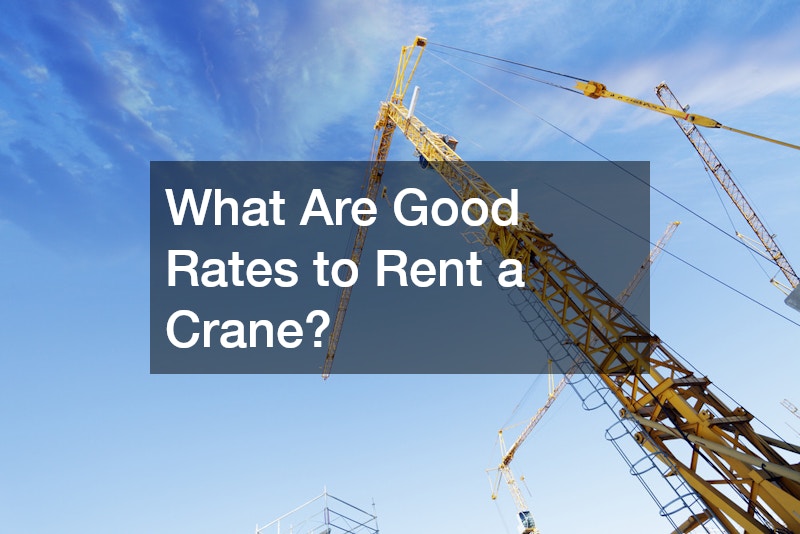Renting a crane can be a significant expense for construction and industrial projects, but it is often a necessary investment to ensure the job is completed efficiently and safely. Understanding what constitutes good rates for crane rental involves considering various factors such as the type of crane, rental duration, geographic location, and additional services. Here’s a detailed guide on what to expect and how to determine good rates when you rent a crane.
Types of Cranes and Their Rates
Mobile Cranes
Mobile cranes are versatile and commonly used for a variety of construction projects.
They are mounted on trucks and can be easily transported to different sites. Rates for mobile cranes typically range from $200 to $1,000 per day, depending on the crane’s lifting capacity and reach. For example:
Small Mobile Cranes (up to 10 tons): $200 to $400 per day.
Medium Mobile Cranes (10 to 50 tons): $400 to $700 per day.
Large Mobile Cranes (50 to 100 tons): $700 to $1,000 per day.
Tower Cranes
Tower cranes are essential for high-rise construction projects due to their height and lifting capabilities. Renting a tower crane can cost significantly more due to the complexity of setup and dismantling. Rates generally range from $15,000 to $30,000 per month, with additional costs for assembly, disassembly, and transportation.
Crawler Cranes
Crawler cranes are heavy-duty cranes with tracks that provide stability and mobility on rough terrain. They are ideal for large-scale construction projects and industrial applications. Rental rates for crawler cranes typically range from $500 to $2,000 per day, depending on the crane’s capacity and specifications.
Small Crawler Cranes (up to 50 tons): $500 to $800 per day.
Medium Crawler Cranes (50 to 150 tons): $800 to $1,500 per day.
Large Crawler Cranes (150 to 300 tons): $1,500 to $2,000 per day.
Rough Terrain Cranes
Rough terrain cranes are designed for off-road applications and are commonly used in construction sites with uneven ground. Rental rates for these cranes range from $300 to $1,000 per day, depending on the crane’s capacity.
Factors Influencing Crane Rental Rates
Rental Duration
The length of the rental period significantly impacts the overall cost. Daily rates are typically higher for short-term rentals, while long-term rentals (weekly or monthly) often come with discounted rates. For instance, renting a crane for a month may cost significantly less per day than renting it for a single day.
Geographic Location
Rental rates can vary based on geographic location due to differences in demand, availability, and local market conditions. Urban areas with high construction activity might have higher rental rates compared to rural areas. Additionally, transportation costs to and from the rental site can add to the overall expense.
Crane Specifications
The crane’s lifting capacity, reach, and additional features (such as specialized attachments or technology) can affect rental rates. Higher-capacity cranes or those with advanced capabilities generally cost more to rent. Ensure you select a crane that meets your project’s specific needs without overpaying for unnecessary features.
Operator Fees
Many crane rentals include the option to hire a certified crane operator, which can be essential for ensuring safety and efficiency. Operator fees can range from $50 to $150 per hour, depending on the crane type and operator experience. Including an operator in the rental package can provide peace of mind and streamline project execution.
Additional Services and Insurance
Crane rental companies may offer additional services such as setup, teardown, maintenance, and insurance. These services can add to the overall cost but are often necessary for safe and efficient operation. It’s essential to understand what is included in the rental agreement and factor in any additional costs.
How to Determine Good Rates
Get Multiple Quotes
To determine good rates, it’s advisable to obtain quotes from multiple crane rental companies. Comparing quotes will give you a better understanding of the market rates and help you identify competitive offers. Ensure that all quotes include similar services and specifications for an accurate comparison.
Consider Total Costs
When evaluating rental rates, consider the total cost of the rental, including transportation, setup, operator fees, and any additional services. A seemingly low daily rate might not be the best deal if there are hidden costs or additional fees.
Negotiate
Don’t hesitate to negotiate with rental companies. If you have multiple quotes, use them as leverage to negotiate better terms. Rental companies may offer discounts for long-term rentals or repeat business, so it’s worth discussing these options.
Check Reviews and References
Beyond just looking at rates, consider the reputation of the rental company. Check online reviews and ask for references to ensure the company is reliable and provides quality equipment and services. A reputable company might charge slightly more but can offer better service and reliability, which can save money and hassle in the long run.



